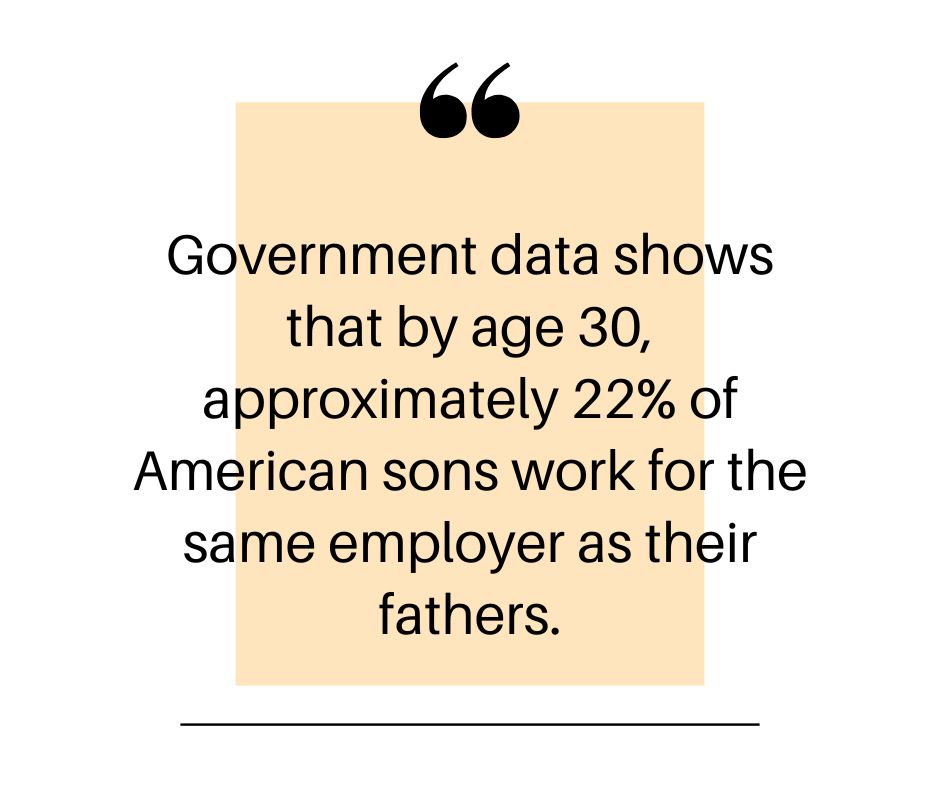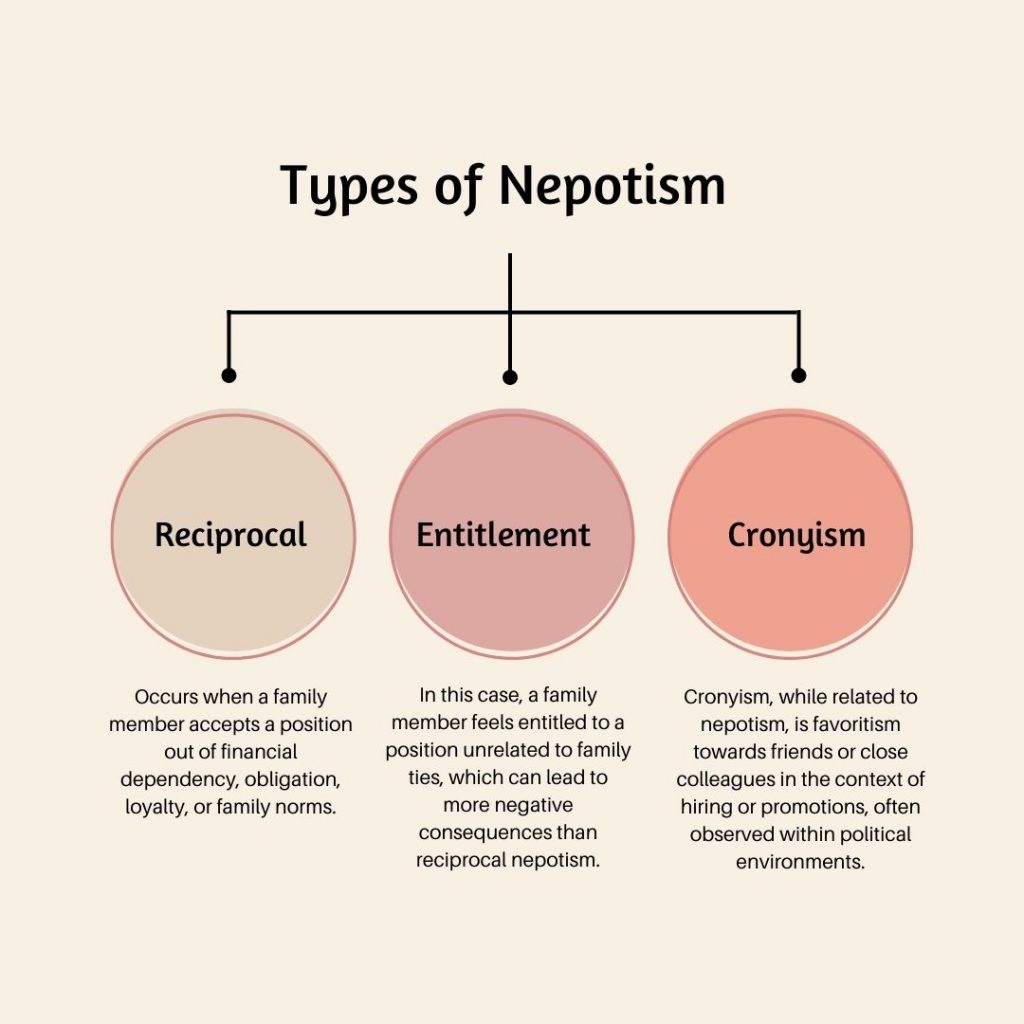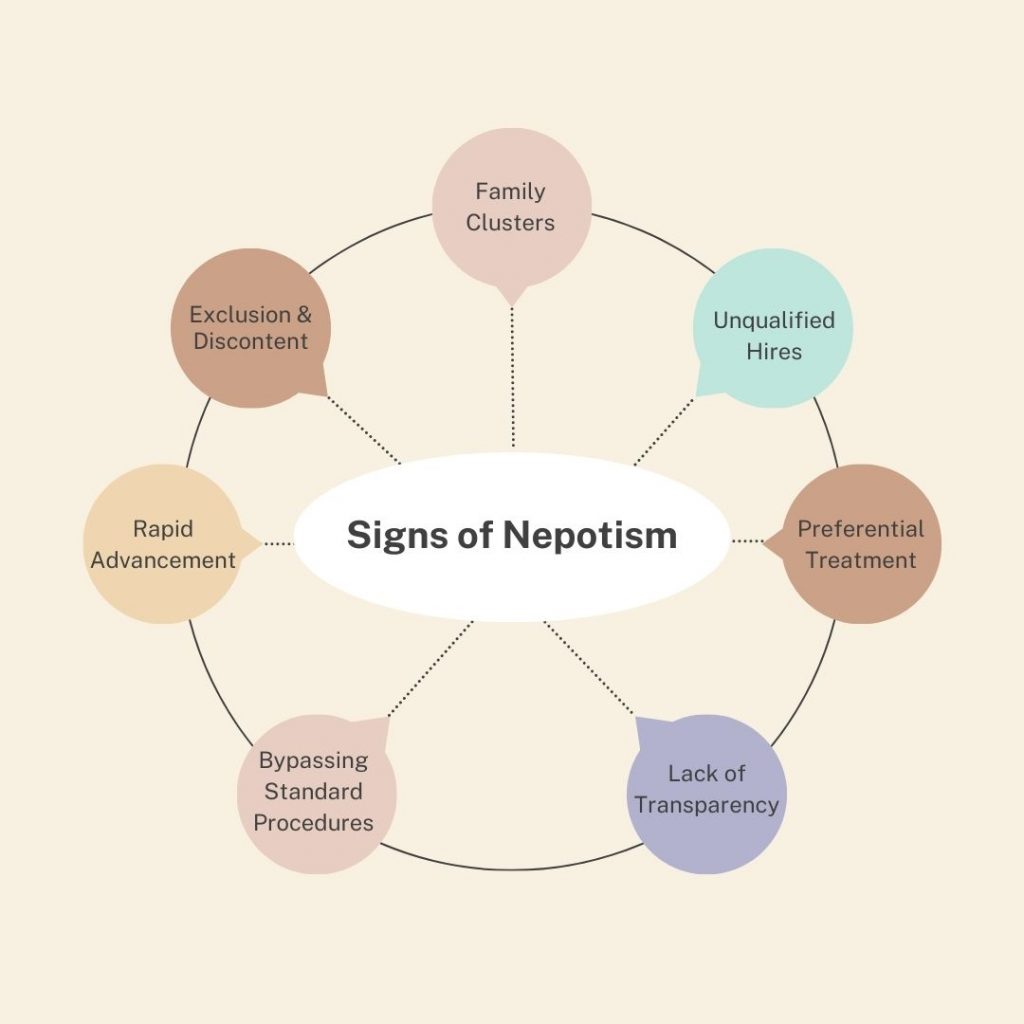
Executive Leadership: The Makings of a Good Leader
As the work landscape is changing, how can executive leadership help businesses adapt, excel, and drive organizational growth?

Family businesses undoubtedly play a significant role in the American economy.
Some of the world’s largest companies, including publicly traded ones, are still under family control. CEOs like those at LG Electronics, Carnival Corporation, and Fidelity Investments often inherit their positions due to their family ties.
Similarly, renowned partnerships such as Ben and Jerry, Hewlett and Packard, Larry Page, and Sergey Brin demonstrate the success that can arise from friendships and shared experiences.
However, while family-owned businesses and friendships can contribute positively to economies, it is essential to recognize that favoritism, cronyism, and nepotism can undermine fairness and the greater good.
In the business world, nepotism, the practice of showing favoritism towards family members, is increasingly viewed as negative.
Hiring or promoting individuals based on personal connections rather than merit can lead to inferior service and exacerbate inequalities while hindering social mobility. Addressing nepotism in the workplace is crucial, and business owners must be prepared for such challenges.
This article aims to provide insights into recognizing and preventing nepotism in the workplace.

To start, what is nepotism?
Nepotism is a form of favoritism that specifically favors family members, including relatives by marriage. Its origins can be traced back to the Latin word “nepos,” meaning nephew, and historically, it referred to the appointments of nephews by Catholic popes to influential positions in the church.
The most infamous case that proves the point comes from Pope Alexander VI (formerly Rodrigo Borgia), who appointed his son, Giovanni, as captain-general of the papal army and established his other son, Cesare, as a cardinal.
However, nepotism extends beyond religious institutions today and permeates various fields, including business, politics, and sports.
In today’s modern business landscape, the question arises: what is nepotism in the workplace?
Nepotism refers to the practice of displaying preferential treatment towards family members or relatives when it comes to crucial decisions such as hiring and promotions. This extends to favoring loved ones for desirable project assignments, preferred shifts, and even merit pay increases.
From a positive perspective, nepotism can create a sense of loyalty and trust within the organization. When employees have family members or personal friends in influential positions, it can lead to improved communication and coordination, as there is a higher likelihood of trust and confidence in relatives.
However, while the concept of nepotism is not new, it demands a fresh perspective in fostering an environment of equal opportunity and innovation.
In an era that champions diversity and the power of diverse perspectives, it is paramount for organizations to recognize and address the potential pitfalls of nepotism.
Unveiling the true extent of nepotism proves to be an elusive challenge, with limited available data. Are children simply following their parents’ paths, or do nepotism and family ties play a role?
A survey conducted by KPMG showed that 71% of respondents believed it was easier to enter professions such as medicine, accounting, or law if they had a parent or guardian already working in a similar field.
Alarmingly, 45% of those with work experience secured it through personal connections like relatives or friends, while only 30% obtained it through their schools.
Government data also shows that by age 30, approximately 22% of American sons work for the same employer as their fathers, a statistic that exceeds the probability of mere chance.

Surprisingly, despite its prevalence, a significant portion of Americans do not view nepotism as a problem, with three-quarters considering it a neutral or positive practice.
Furthermore, research shows that even Gen Z, while vocal about its unfairness, actively engages in and benefits from nepotism. In fact, more than two-thirds of Gen Z workers have used connections to land a job.
This disparity in opportunities based on familial connections further exacerbates existing socio-economic inequalities, with young people from low socio-economic backgrounds facing more significant challenges in accessing work experience and entering certain professions.
You might be wondering, is nepotism illegal in the workplace?
As it turns out, the answer is a complex one.
While nepotism itself is not explicitly illegal in the United States, there are circumstances where it can cross the legal boundary. Certain factors can render it unlawful, such as violations of anti-discrimination laws or the misuse of company resources.
Title VII of the Civil Rights Act of 1964 comes into play when nepotism results in discriminatory practices based on race, national origin, or other protected characteristics.
For example, suppose a job opening is advertised but filled with a less qualified family member while qualified candidates from diverse backgrounds are overlooked. In that case, it can breach the Civil Rights Act.
Interestingly, even organizations that aim to uphold high standards of ethics in the workplace may face unintended consequences.
Strict, anti-nepotism policies can also lead to claims of sexual discrimination, as they disproportionately affect women who marry coworkers and find themselves constrained by such policies.
Striking a balance between family ties and fair treatment requires careful consideration of legal obligations and maintaining an inclusive work environment.
Understanding the implications of nepotism can shed light on its consequences and its impact on individuals and societies.

While nepotism can be subtle and difficult to pinpoint, specific indicators may suggest its presence:

Imagine an employee who consistently witnesses their colleagues being favored not based on performance but solely due to family ties. Can anyone truly feel happy at work and appreciated in such an environment?
Employees who witness less experienced individuals being promoted based on personal connections rather than merit can feel undervalued and unappreciated, leading to resentment towards both organizational leadership and the beneficiaries of nepotism. This can create a hostile work environment and stifle employee morale, fostering an “us versus them” mentality.
Additionally, nepotism can undermine work productivity in two ways.
Firstly, employees who perceive their efforts as going unnoticed may lose motivation to perform at their best, resulting in reduced engagement and satisfaction.
Secondly, hiring unqualified family or friends can lead to lower productivity, as they may not possess the necessary skills or qualifications for their roles, impacting overall team performance.
The American dream, rooted in the belief that hard work and determination can lead to success, faces a critical question: Does nepotism undermine this principle?
When individuals gain advantages and opportunities solely based on family connections, the meritocratic ideals on which the American dream is built are questioned.
As studies have shown, nepotism can profoundly affect an organization. It not only raises ethical concerns but also plays into a range of challenges.
When individuals perceive that promotions and opportunities are not based on merit but on personal connections, it breeds skepticism and erodes trust within the workforce.
Research indicates that individuals benefiting from nepotism are often seen as successful, not due to their abilities and efforts but rather because of their personal relationships with upper management.
As a result, they are perceived as less competent and lacking the essential qualities of successful managers. Interestingly, these negative perceptions persist regardless of the family members’ qualifications.
Nepotism creates an environment where motivation and engagement suffer.
One of the major repercussions is that employees may find themselves assigned unfavorable and complex tasks, often without receiving due recognition for their efforts.
This unbalanced workload distribution can lead to burnout, where individuals feel exhausted and overwhelmed due to excessive demands. When employees are not adequately recognized or rewarded for their hard work, their sense of fulfillment diminishes, further exacerbating the problem.
Nepotism undermines fairness and trust and opens the door to cronyism and favoritism in the workplace. When employees witness that success is achieved not through genuine effort but by forming close relationships with influential individuals, it creates a toxic environment that affects the employee experience.
Such dynamics can greatly impact teamwork and collaboration within an organization. In short, the presence of nepotistic practices within teams can lead to disharmony and division.
What are the broader repercussions of nepotism?
The existence of nepotism within an organization can have detrimental effects on its culture and reputation.
Nepotism breeds toxicity in the workplace, fostering an environment riddled with resentment, gossip, and mistrust among colleagues. Furthermore, if not addressed appropriately, nepotism can expose a business to potential legal ramifications, compounding the negative consequences.
One of the costliest outcomes of nepotism is its damage to the employer’s reputation. Dissatisfied current or former employees are unlikely to endorse the company to others, hampering its ability to attract and retain top talent.
Moreover, if clients and customers become aware that the company favors hiring friends and family over the most qualified candidates, their trust in the company’s products or services may be compromised. Such revelations can significantly impact the company’s bottom line and undermine its standing in the market.

In the realm of fame and fortune, a distinct group of individuals has made waves in their respective industries, capturing attention and stirring controversy – the so-called “nepo-babies.”
Coined from the term “nepotism baby,” these are the children of celebrities who have achieved remarkable success in careers closely aligned with their famous parents or other esteemed relatives.
From Hollywood to politics and beyond, nepo-babies have become a frequent topic of discussion, sparking debates about fairness, talent, and opportunity.
Consider the following examples of nepotism in the workplace:
These examples shed light on the complex dynamics of nepotism, its implications, and the ethical considerations surrounding it.
In many family-owned enterprises, nepotism is an inherent part of the organizational structure. While it is challenging to quantify the extent of nepotism precisely, studies reveal that family-owned businesses employ approximately 62% of workers in the United States.
But how can organizations effectively address and navigate cases of nepotism?
Is it possible to rectify the damage caused and restore trust within the workforce?
These questions become crucial as companies seek to uphold fairness, enhance employee engagement, and safeguard their reputation.
Let’s explore strategies and considerations for handling nepotism within organizations.
To proactively tackle the potential problems associated with nepotism in the workplace, it is essential to establish clear policies and guidelines within the employee handbook.
Consider the following factors when crafting an effective policy:
Code of Ethics: Include a comprehensive code of ethics that explicitly addresses nepotism. This code should clearly outline the organization’s stance against favoritism based on family connections.
Parameters & Guidelines: Instead of outright banning the hiring of family members, establish specific parameters and guidelines for such situations.
For example, consider implementing a policy that allows relatives to work within the same company as long as they do not have a direct reporting relationship to avoid conflicts of interest and biased decision-making.
Can transparency build trust?
Encourage employees to express their concerns and provide feedback through confidential channels.
By actively listening and addressing their grievances, organizations can foster a sense of inclusivity, demonstrating a commitment to rectifying past issues and preventing future occurrences of nepotism.
When allegations of nepotism arise, conducting impartial investigations is paramount. Independent teams or external consultants can be engaged to evaluate the circumstances and gather evidence objectively.
Organizations and HR departments must prioritize meritocracy in decision-making to maintain trust and confidence. Clearly define the criteria for recruitment, promotions, and other decision-making processes, emphasizing merit-based evaluations and equal opportunities for all employees.
Implementing performance-based evaluations, structured feedback mechanisms, and objective performance metrics helps ensure that promotions and rewards are based on competence and results.
Do your employees feel safe to speak up?
Encouraging a whistleblowing culture and providing secure reporting mechanisms are essential steps in combating nepotism.
Regular monitoring, anonymous feedback mechanisms such as an ethics hotline, and transparent policies can help mitigate the harmful effects of nepotism.
Organizations can uncover hidden cases and address them effectively by empowering employees to report instances of nepotism without fear of retaliation. Robust systems for reporting and investigating allegations ensure that concerns are taken seriously and action is taken promptly.

In conclusion, nepotism in the workplace is a complex issue that can have far-reaching consequences.
While family-owned businesses and personal connections can bring positive contributions, it is essential to recognize the negative impacts of nepotism on fairness, equality, and social mobility.
Senior Content Writer at Shortlister
Browse our curated list of vendors to find the best solution for your needs.
Subscribe to our newsletter for the latest trends, expert tips, and workplace insights!

As the work landscape is changing, how can executive leadership help businesses adapt, excel, and drive organizational growth?

From pioneering attempts to break systematic barriers to modern strides in gender equality, uncover the inspiring history of women’s contributions to the professional world.

Unlock a more inclusive, supportive, and empowering future for women in the workforce.

Discover the game-changing shift from a weight-focused worksite wellness model to a weight-inclusive approach, where health and well-being thrive beyond the scale.
Used by most of the top employee benefits consultants in the US, Shortlister is where you can find, research and select HR and benefits vendors for your clients.
Shortlister helps you reach your ideal prospects. Claim your free account to control your message and receive employer, consultant and health plan leads.